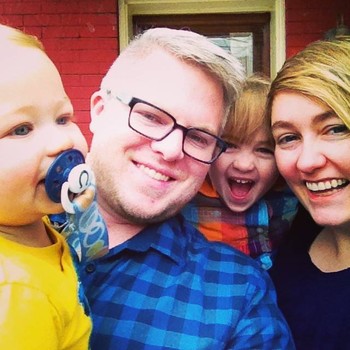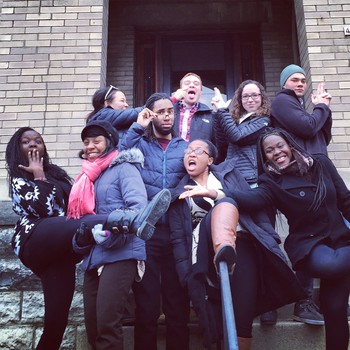Adventures of a Presbyterian pastor on a Jesuit campus
 Pentecost ears
Pentecost ears
Listening for God in other languages
by Abby King-Kaiser
It’s summer. The tumbleweed blows through our campus (metaphorically of course—I live in Ohio) to the soundtrack of construction paced to be complete by August. I latch onto any student that I see, my extroverted personality feeling the challenge of this quiet season of campus ministry.
In the basement of a pub on campus, I discuss the direction of the school’s gospel choir with our Catholic musician and liturgist, a Baptist alum, and the Jesuit-educated director of the Dorothy Day Center for Faith and Justice, where I work. Over coffee or in my office, I ask hard questions of the choir’s student leaders about their sense of direction in the coming year. I sit across from a political science professor, swapping stories of our families and kids, comparing faith journeys, and reflecting on the students’ developmental needs. He is Muslim, but so much of my engagement with God is reflected in his own. I submit sketches to the director of the Center for Diversity and Inclusion on campus, wrestling with how to illustrate the complexity of students’ identities. I dream about the structure of our Protestant worship gathering, while Instagramming summer reading questions for student leaders. I start reading Dorothy Day’s diaries in preparation for a trip exploring issues of racial and economic injustice. Each day, I am confronted by my own ignorance. Each day, I wrestle to recover my sense of belovedness before God. Each day, I meet God in the face of someone whose religious tradition is different (sometimes very different) from my own.
In my last three years as a campus minister—an ordained teaching elder of the Presbyterian Church (U.S.A.) at a Jesuit university, challenged to serve all the non-Catholics (and a wandering Catholic or two)—the words of Acts 2 and its story of Pentecost have come alive, waking me up to the breadth of God I didn’t previously know I was missing.
I was ordained in the same Presbyterian church where I was baptized. I stopped going to church early in high school but never stopped pursuing God. I left for seminary unsure of whether I was Presbyterian or whether I just was a shaped by Northminster. At an interdenominational seminary, I discovered my Reformed roots, while being shaped by the gifts of many traditions. But, when I headed into a first call at a small, urban, PC(USA) church, it was easy never to set foot outside of this tight-knit denominational family that I love dearly.

Students in Abby King-Kaiser’s campus ministry Common Ground
Then I was hired to advise the Muslim Students’ Association and the Jewish Student Organization at Xavier University. I learned and taught scriptural reasoning, an interfaith reading-group model. I met the Ecumenical Ministry Team, with whom I would spend most of my time and started the first weekly Protestant worship service on our campus, only to realize that none of the students came from my own tradition. I listened as students debated the Trinity, shared why speaking in tongues shaped them, and deconstructed the challenge of being immersed in a culture so different from the one they grew up in. I grew comfortable with my own ignorance, beginning to see it as a gift rather than a challenge. I perfected conversations where the bottom line is: “I can’t answer that for you—you have to answer it for yourself.” I reveled in the breath of new each August, as a full 25 percent of our “parish” turned over.
We all know the Pentecost story. Some of us tire of trying to preach some new angle on Acts 2 one . . . more . . . time . . . each May. How many different ways can you tell the same story about difference?
The Spirit sweeps in, and the Galileans are suddenly speaking in the languages of the audience. Most of the interpretations I have heard of this story focus on those doing the talking, the amazing gift of being filled with the Spirit to speak for God. We are so quick to start the story with ourselves, with the church, with what we are called to do. Rarely do we start with the audience. And yet, in this story, when I start with those listening, I see that maybe, just maybe, the gift of Pentecost is the gift of understanding: “And how is it that we hear, each of us, in our own native language?” (2:8). Sure, the Spirit influenced what was being said, but maybe the Spirit had a bigger impact on what was being heard. What if I am not the one speaking, but the one listening?
Perhaps it should be “ordinary” (that’s what they call this time after Pentecost) to listen for God, to seek understanding of God, through those who are different.
When I put myself in the position of being a disciple of Christ who is listening and understanding, rather than speaking, I meet God. I meet God in a Muslim student preaching on loving his neighbors. I meet God in a student who seeks God in pain caused by the church. I meet God in the grace of colleagues who see in me what I cannot. I meet God in the true, original, and amazing testimony of our students in words, music and prayer. If I listen, I see the Spirit moving everywhere.
Abby King-Kaiser is the Assistant Director for Ecumenical and Multifaith Ministry at the Dorothy Day Center for Faith and Justice at Xavier University. She returned to her hometown of Cincinnati, Ohio for this call after a long sojourn in the Bay Area. She is a coffee snob, occasional painter and obsessive, though amateur, Instagrammer (@revabbykk).